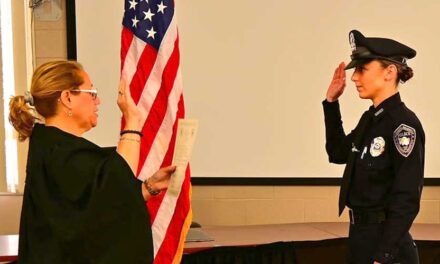By DAN TOMASELLO
NORTH READING — The School Committee and a small group of parents sparred Monday night over the school department’s decision to administer the Partnership for Assessment of Readiness for College and Careers (PARCC) exam this month.
The school board approved the new high stakes test last June in a 4–1 vote over the objections of a group of concerned parents. The Board of Elementary and Secondary Education announced last year school districts had the choice to go with either MCAS or PARCC this year.
The Board of Elementary and Secondary Education is tentatively scheduled to vote sometime this fall on whether Massachusetts should replace MCAS with the PARCC exam. Governor Charlie Baker has requested the Board of Elementary and Secondary Education to hold a series of hearings across the state to gather feedback about replacing MCAS with PARCC.
The North Reading school department is currently administering a paper version of PARCC in four schools in grades 3-8. The only school taking the electronic version of PARCC is the Batchelder School. The Batchelder School began administering PARCC via desktop computers and Chromebooks on March 16. The Little and Hood schools began taking the paper version of PARCC on March 23. The middle and high schools will begin taking the new exam on March 31.
Additionally, freshmen are taking the grade 9 Algebra 1 exam. Sophomores are once again taking the MCAS to meet the state’s graduation requirement. Special education students are taking the MCAS-Alt exam and the MCAS science exam is being administered to students in grades 5 and 8.
One of the biggest differences between the two tests is that PARCC is a timed test while MCAS is not timed.
Assistant Superintendent of Schools Dr. Patrick Daly said North Reading is “test-driving” PARCC in order to provide feedback to the Department of Elementary and Secondary Education (DESE) about the exam. He also tried to clarify parental concerns by saying both PARCC and MCAS measure the Common Core Educational Standards.
“Both the PARCC and MCAS assessments are designed to measure the Common Core State Standards,” said Daly. “PARCC was designed with the Common Core in mind, while MCAS has been adapted to measure Common Core.”
Similar to the MCAS, students will receive PARCC scores after they take the exam. Daly also said each school and the district will receive accountability scores, but they will be “held harmless” while the school system test drives the new test. He said the scores will be released later in the fall.
According to data provided by DESE, 54 percent of school districts have decided to administer PARCC this school year in grades 3-8, while 46 percent of school districts opted to administer the MCAS.
If the state decides to replace MCAS with PARCC, Daly said DESE will want school districts to administer PARCC electronically. He said the state legislature has approved a $38 million bond bill to fund technology infrastructure upgrades for schools, $5 million of which has been appropriated. Daly said the district applied for the grant and is currently a candidate to receive funding, but he said the town will need to match the grant. He said the state funds would be used to make the three elementary schools wireless, while town funds would be used to purchase devices.
“We are in a very good place to receive this funding,” said Daly.
Daly said teachers have expressed “mixed feelings about PARCC.” While a number of teachers said they believe PARCC is a rigorous exam, teachers noted students have yet to learn some of the content covered in the exam.
School Committee Chairman Jerry Venezia asked Daly how many parents have decided to “opt” their children out of PARCC. He also asked why parents have decided not to have their children take the test.
Daly said 25 students in the school system will not be taking PARCC, which includes 12 students at the Hood School, six at the middle school, four at the Little School, two at the Batchelder School and one at the high school. Superintendent of Schools Jon Bernard said the majority of parents who opted their children out of PARCC said it was because they oppose Common Core and PARCC.
Parents raise many concerns
Three parents who attended the meeting raised several concerns about the PARCC exam, including their perception that the schools are “teaching to the test” and debated the merits of PARCC with school officials.
School Committee candidate Julie Koepke, a PARCC opponent, said she doesn’t believe the district is in a position to apply for the technology grant because the school department is facing a $700,000 budget gap.
Venezia responded the technology funds would come from the town’s capital budget, not the school department’s operating budget.
Elizabeth Rymill, 1 Williams Road, she said took the PARCC practice exam currently available online to learn more about the test before her third and sixth graders took it. She said believes the English component of the exam is “pretty straight forward,” but said she thought the math exam was confusing. She believes the PARCC math exam’s “unclear procedures” have made students nervous while taking the exam.
Daly said school officials have found errors on some PARCC questions, but he said the same thing occurred when the MCAS was first launched.
Rymill also said some PARCC questions are requiring students to give two answers, which she believes is “setting our kids up to fail.” She also claimed her sixth grader is doing PARCC related assignments for homework. She also said both of her children have reported they have spent the majority of their time in school preparing for the PARCC exam. She also said her child has yet to write a book report this year because students have been preparing for PARCC.
Lastly, Rymill urged school officials to reach out to Batchelder School parents to gain more feedback about students’ experience taking PARCC.
Daly acknowledged there have been some challenges administering PARCC at the Batchelder School. He also said if “students feel their homework is PARCC, that is not a good thing to hear.”
Koepke agreed with many of Rymill’s concerns. She said her son, a middle school student who is not taking PARCC this year, asked for help with vocabulary homework recently. Upon looking at the vocabulary list, Koepke said “PARCC terminology” was included at the top of the list, which she called “inappropriate.” She said different words should have been used instead of PARCC on the vocabulary list. She said she called Middle School Principal Catherine O’Connell to express her “disapproval.”
“I think a lot of that stuff is going on, but I am not sure if a lot of parents are sharing it,” said Koepke.
While Venezia said he respected Koepke’s opinion because she is an educator, he said she disagreed with her sentiment.
“I am not sure if each individual parent can be looking at what we are teaching and what we are testing, and decide individually this is what I prefer and this is what I prioritize,” said Venezia.
A parent in the audience who did not identify herself also stated the middle school was assigning PARCC related homework assignments. “Homework should focus on curriculum, not how to take PARCC,” she said.
The parent also claimed the school department has provided “no information” about PARCC. School Committee member Mel Webster disagreed with the parent’s claims, and noted the school department held forums in January about the exam. Venezia said “only five or six people showed up” at the forums.
Superintendent of Schools Jon Bernard said the school department has been very transparent about the PARCC exam.
“Information has been out there, but if people are choosing not to take advantage of that by visiting the (school) website, attending forums or reading information that has been distributed by either their principal or district administration, that is their choice to make,” said Bernard.
Bernard also noted school officials are not “championing” PARCC over MCAS, but stressed the main reason why the school department decided to implement PARCC over MCAS this year was because they wanted to prepare students for whatever comes next.
“We thought it was important in shaping that discussion,” said Bernard. “If there is any belief that communication has shut down or there is not an opportunity for people to discuss, it is false.”
The anonymous parent also said even though the school system’s data will be “held harmless” this year, she said PARCC has the potential to have a negative impact on students if they have a negative experience taking it.
Venezia disagreed.
“Kids have to be able to deal with things as they move through life,” said Venezia. “You can’t say my child is comfortable with the MCAS zone and we can’t break out of it.”
School Committee Vice Chairman Cliff Bowers said students are “not being hurt at all” by being exposed to PARCC. He said students are going to be thrown curve balls over the course of their entire lives and they are going to have to learn to deal with it.
“Kids today can handle all kinds of stuff,” said Bowers.
Bernard also noted he attended a DESE forum about PARCC last week that featured DESE Commissioner Mitchell Chester and Secretary of Education James Peyser. He said the jury is still out on what comes next in regards to standardized testing.
“Nothing was said there that caused me to drive home and say this is a done deal,” said Bernard. “They were very receptive about hearing feedback from school districts and they want to hear feedback. But we can only provide that if we hear from folks.”
Webster urged parents to contact the School Committee or school officials about their concerns related to PARCC.
“The only way for parents to register their concern is to contact us,” said Webster.




